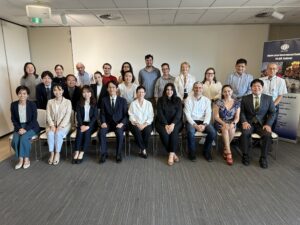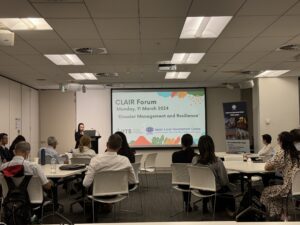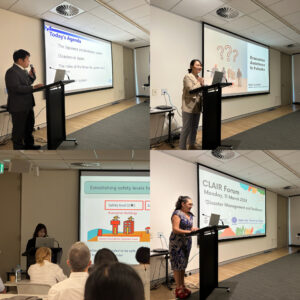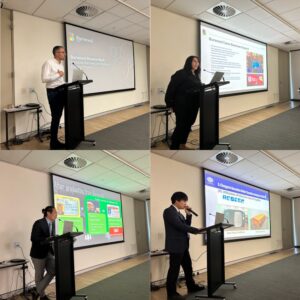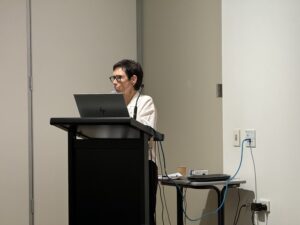申し訳ありません、このコンテンツはただ今英語のみです。
Uncategorised
-
*English only.
The latest issue of our correspondence is released.
View this Correspondence in PDF.
-
*English only.
The latest issue of our correspondence is released.
View this Correspondence in PDF.
-
*English only.
The latest of our correspondence is released.
View this Correspondence in PDF.
-
*English only.
The latest issue of our correspondence is released.
View this Correspondence in PDF.
-
2023/2024 CLAIR Forum
開催日 2024年3月11日(月)
テーマ Disaster Management and Resilience
会場 The Japan Foundation, Sydney – Seminar Room(オンライン同時配信)
主催 クレアシドニー事務所
共催 シドニー工科大学公共政策研究所 (UTS:IPPG)
【発表者・内容】
① 竹村所長補佐(総務省)
日本における近年の災害発生状況や、災害に係る日本の行政組織(国・都道府県・市町村)の役割のほか、総務省が制度化した対口支援方式の能登半島地震における稼働状況を説明しました。
② 國﨑所長補佐(福岡県庁)
福岡県における近年の大雨災害の様子、避難行動要支援者の支援の取り組み(市町村指導、避難所運営及び個別避難計画作成に関する研修・訓練等)について、説明しました。
③辻脇所長補佐(和歌山県庁)
「世界津波の日」制定の由来となった和歌山県出身 浜口梧陵の逸話に触れるとともに、和歌山県の特徴的な災害対策として、避難先の安全レベルの設定や、移動式給油機「どこでもスタンド」、出張防災教育について説明しました。
④Nicole Parsons 氏( Illawarra Shoalhaven Joint Organisation )
※当日欠席のため、Vanessa Chan氏が代読Illawarra Shoalhaven地域の災害リスク低減のため、地方自治体やパートナーと連携したインフラの耐久性向上や地理的データのアクセス向上、また、環境モニタリングや早期警告システムの開発などの取り組みについて説明がありました。
⑤松本所長補佐(千葉県市原市役所)
千葉県市原市における災害対応について、説明しました。発災時の体制、避難所の種類・開設条件、備蓄品といった基本事項を扱うとともに、コロナ禍における避難所運営の変化に関して、取り組んできた事例を紹介しました。
⑥太田所長補佐(神奈川県小田原市役所)
日本の災害時における医療について、特に被災時におけるDMATの概要、プロセス、厚生労働省と県、災害拠点病院の役割について、小田原市立病院によるDMATの能登半島地震への派遣などの実例を交え説明しました。
⑦Tommaso Briscese氏、Miriam Wassef 氏(Burwood Council)
Burwood Councilにおける、 COVID-19の対応や復興の取り組みとして、コミュニティへのケアや、地域経済復興のための中小企業への財政支援、人的交流を促進させるイベントや空間づくりについて説明がありました。
⑧Q&A、Summary
Q&Aセッションでは、参加者から多くの質問をいただき意見交換ができました。最後にCarol Mills氏が、フォーラム全体を振り返りつつ、締めくくりを行いました。
-
*English only.
The latest issue of our correspondence is released.
View this Correspondence in PDF.
-
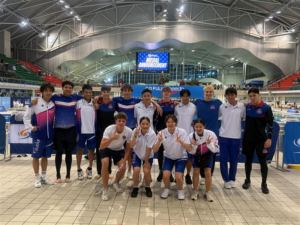 12月3~13日、福岡県水泳連盟の選抜選手8名がNSW州を訪問し、現地の学校との合同練習とNSW州の大会に参加しました。合同練習では現地の選手との交流を深め、大会では福岡県の選手たちが数々のメダルを獲得する素晴らしい成果を収めました。本訪問は、2023年12月に福岡県・福岡県水泳連盟・NSW州水泳連盟の3者で締結されたMOUに基づく取り組みです。クレアシドニー事務所は、福岡県からの依頼を受け、一部行程の同行などのサポートを行いました。今後も、福岡県とNSW州のスポーツ交流がさらに進展するよう、引き続き、支援してまいります。選手の皆さん、監督、コーチ、同行された職員の皆さん、本当にお疲れさまでした!
12月3~13日、福岡県水泳連盟の選抜選手8名がNSW州を訪問し、現地の学校との合同練習とNSW州の大会に参加しました。合同練習では現地の選手との交流を深め、大会では福岡県の選手たちが数々のメダルを獲得する素晴らしい成果を収めました。本訪問は、2023年12月に福岡県・福岡県水泳連盟・NSW州水泳連盟の3者で締結されたMOUに基づく取り組みです。クレアシドニー事務所は、福岡県からの依頼を受け、一部行程の同行などのサポートを行いました。今後も、福岡県とNSW州のスポーツ交流がさらに進展するよう、引き続き、支援してまいります。選手の皆さん、監督、コーチ、同行された職員の皆さん、本当にお疲れさまでした!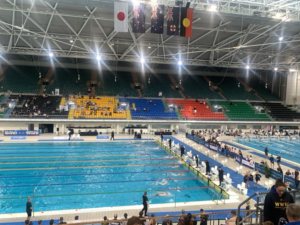
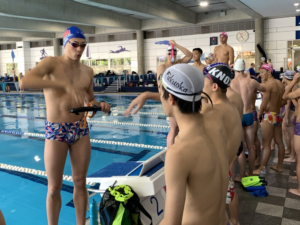
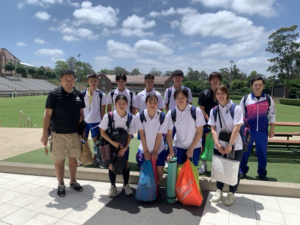
-
*English only.
The latest issue of our correspondence is released.
View this Correspondence in PDF. -
*English only.
The latest issue of our correspondence is released.
View this correspondence in PDF.
-
*English only.
The latest issue of our correspondence is released.
View this Correspondence in PDF.

